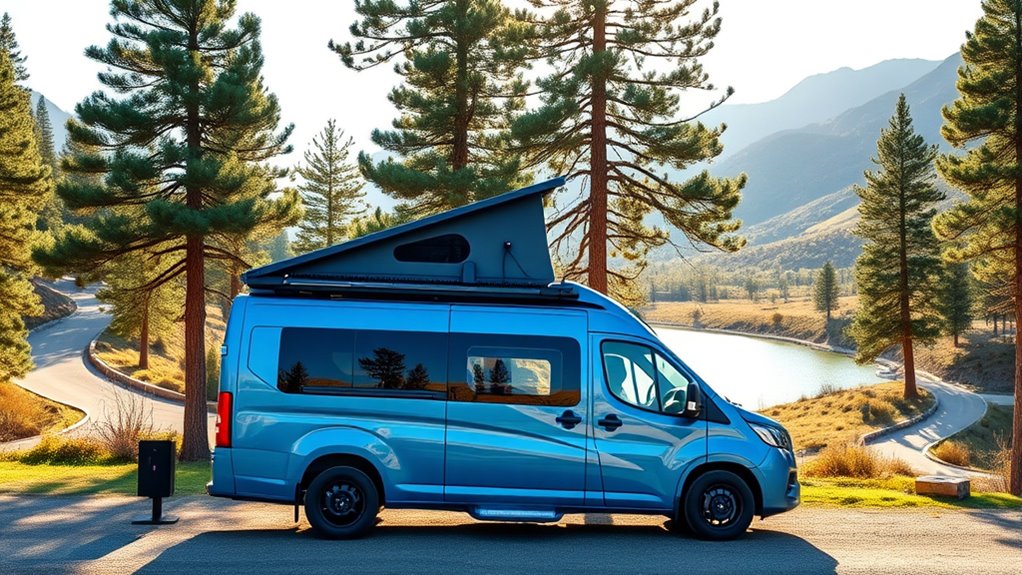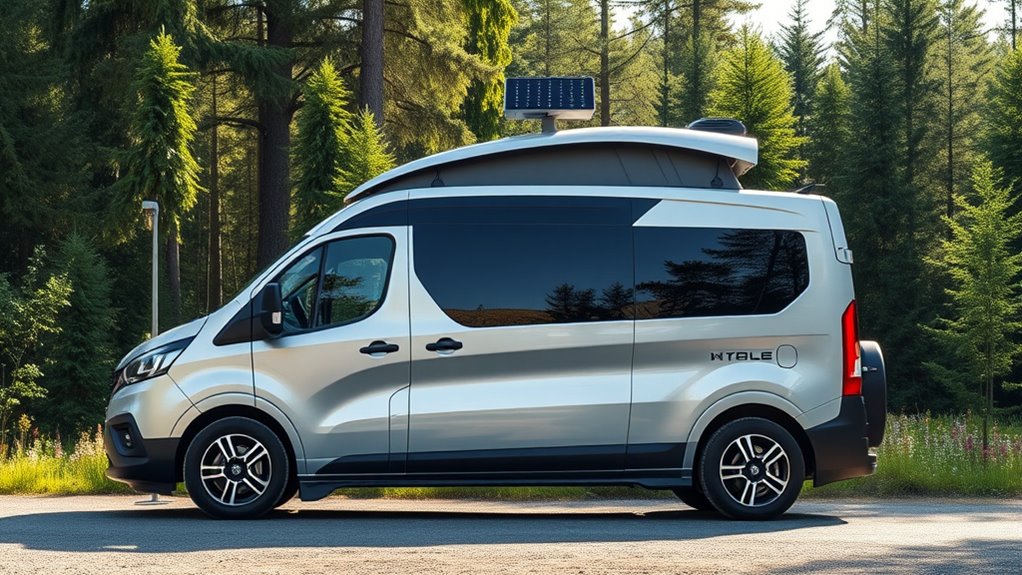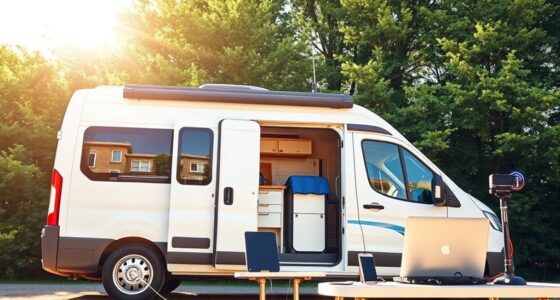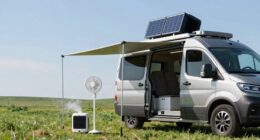Electric campervans are revolutionizing van life by leveraging advances in battery technology, solar integration, and smart power management systems. Improved batteries offer longer range, faster charging, and better energy density, enabling off-grid adventures with minimal environmental impact. High-efficiency solar panels and autonomous energy systems boost sustainability and independence. These innovations make electric campervans more practical and eco-friendly, transforming your exploration possibilities. To uncover how these technological shifts continue shaping van life, keep exploring the latest developments.
Key Takeaways
- Advanced batteries enable longer range and faster charging, making electric campervans more practical for extended travel.
- Solar integration allows off-grid energy independence, reducing reliance on external charging infrastructure.
- Smart power management systems optimize energy use, enhancing efficiency and onboard comfort.
- Technological innovations promote eco-friendly travel by decreasing fossil fuel dependence and emissions.
- Continuous advancements in battery and solar tech are driving more reliable, sustainable, and autonomous van life experiences.

The evolution of electric campervans reflects a significant shift in recreational vehicle technology driven by advances in battery design, power management, and sustainable energy integration. Central to this transformation is the progression of battery technology, which now enables longer range, faster charging, and more efficient energy storage. Lithium-ion batteries, once the standard, have been continually refined through improvements in energy density and cycle life, allowing campervans to store greater amounts of power within a more compact form. This enhancement directly impacts usability, permitting extended off-grid excursions without frequent recharge concerns. Additionally, developments in solid-state batteries promise to further elevate safety and energy density, pushing the boundaries of what electric campervans can achieve.
Complementing battery advancements is the integration of solar power systems, which have become a pivotal component in sustainable energy management for van life. Modern campervans are equipped with high-efficiency solar panels that convert sunlight into usable electrical energy with increasing effectiveness. These panels are often mounted on roofs, designed to maximize surface area while maintaining aerodynamics. The synergy between solar power and advanced battery systems allows for a more autonomous energy ecosystem, reducing reliance on external charging infrastructure. As solar technology improves, with higher conversion efficiencies and flexible materials, you benefit from increased energy harvesting potential even in less ideal sunlight conditions, therefore extending your off-grid capabilities. Innovations in power management systems have also evolved to optimize the use of stored and generated energy. Smart inverters and energy controllers now dynamically balance power flow between batteries, solar inputs, and onboard appliances. This ensures minimal energy waste and prolongs battery lifespan, fostering greater reliability. You can monitor and adjust energy consumption in real-time, making informed decisions that maximize your campervan’s sustainability and efficiency. These technological integrations support a seamless changeover from traditional internal combustion engines to clean, renewable energy sources.
Frequently Asked Questions
What Is the Average Lifespan of an Electric Campervan Battery?
You can expect an electric campervan battery to last between 8 to 15 years, depending on usage and maintenance. Battery degradation occurs gradually, reducing capacity over time. Proper maintenance, like avoiding extreme temperatures and regular charging, can extend lifespan. Manufacturers often offer warranties covering 8 years or around 100,000 miles, reflecting the typical durability range. Monitoring battery health helps optimize performance and longevity during your van life adventures.
How Long Does It Take to Fully Charge an Electric Campervan?
It typically takes 4 to 8 hours to fully charge an electric campervan, depending on its battery capacity and the charging station’s power output. Faster charging stations, like DC fast chargers, can reduce this time to around 30 minutes to 2 hours for a substantial charge. You should consider the battery capacity and available charging stations along your route to maximize charging times and ensure reliable power for your adventures.
Are Electric Campervans Suitable for Off-Grid Camping?
Electric campervans are suitable for off-grid camping when equipped with solar power systems, enhancing their off-grid capabilities. Solar panels can generate renewable energy, reducing reliance on external charging sources and extending your stay in remote areas. To optimize off-grid performance, verify the campervan has high-capacity batteries, efficient energy management, and sufficient solar panel surface area. Proper setup allows you to maintain power stability while exploring remote locations confidently.
What Are the Costs Compared to Traditional Fuel-Powered Campervans?
Think of the cost comparison between electric and fuel-powered campervans as balancing a high-tech ledger. Electric models often have higher upfront costs, but lower maintenance expenses due to fewer moving parts. Over time, savings on fuel and repairs can offset initial investment, making EVs more economical. While the purchase price may seem steep, the long-term financial benefits, especially in maintenance, paint a compelling picture of electric campervans as savvy, cost-effective choices.
How Do Electric Campervans Perform in Extreme Weather Conditions?
Electric campervans handle extreme weather better with advanced thermal insulation that maintains internal comfort and battery heating systems that prevent power loss. In cold conditions, battery heating ensures consistent performance, while thermal insulation minimizes heat transfer. However, performance can decline in severe cold, reducing range. Proper insulation and efficient battery heating are essential for reliable operation, making electric campervans viable even in challenging climates, provided these systems are well-designed.
Conclusion
As electric campervans continue to evolve, they transform the landscape of van life into a dynamic ecosystem powered by innovation. Just like a river carving new pathways, EVs reshape our travel experiences, blending sustainability with practicality. Their advancements in battery technology, charging infrastructure, and design signify a pivotal shift towards greener, more autonomous journeys. Embracing this evolution means you’re steering through a future where technology and nature harmoniously converge.










